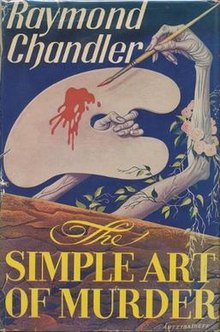The Simple Art of Murder

First edition
|
|
| Author | Raymond Chandler |
|---|---|
| Cover artist | Artzybasheff |
| Country | United States |
| Language | English |
| Genre | Crime fiction, literary criticism |
| Publisher | Houghton Mifflin |
|
Publication date
|
1950 |
| Media type | |
| OCLC | 17506654 |
| 813/.52 19 | |
| LC Class | PS3505.H3224 S56 1988 |
The Simple Art of Murder refers to hard-boiled detective fiction author Raymond Chandler's critical essay, a magazine article, and his collection of short stories. The essay was first published in The Atlantic Monthly in December 1944. The magazine article appeared in the Saturday Review of Literature, April 15, 1950. The article, somewhat rewritten, served to introduce the collection The Simple Art of Murder, 1950 (Houghton Mifflin Co.), which contained eight of Chandler's early stories pre-dating his first novel, The Big Sleep.
The essay is considered a seminal piece of literary criticism. Although Chandler's primary topic is the art (and failings) of detective fiction, he touches on general literature and modern society as well.
The opening statement – "Fiction in any form has always intended to be realistic" – places Chandler in a lineage with earlier American Realists, in particular Mark Twain and his critique of James Fenimore Cooper, "Fenimore Cooper's Literary Offenses". Chandler dissects A. A. Milne's The Red House Mystery much as Twain tears apart Cooper's , namely by revealing what is ignored, brushed over, and unrealistic. "If the situation is false," Chandler writes, "you cannot even accept it as a light novel, for there is no story for the light novel to be about." He expands his criticism to the bulk of detective fiction, especially of the English variety which he complains is preoccupied with "hand-wrought dueling pistols, curare and tropical fish." In addition to Milne, Chandler confronts Dame Agatha Christie, Dorothy Sayers, Sir Arthur Conan Doyle, E. C. Bentley, and Freeman Wills Crofts. "The English may not always be the best writers in the world, but they are incomparably the best dull writers." Chandler's critique of the "classic" Golden Age detective story goes beyond a lack of realistic characters and plot; Chandler complains about contrivances and formulas and an inability to move beyond them. The classic detective story "has learned nothing and forgotten nothing."
...
Wikipedia
